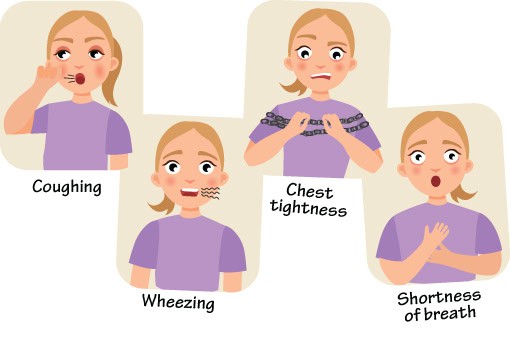“Understanding Asthma: Symptoms, Triggers, Management, and Prevention
Understanding asthma is crucial for managing its symptoms and preventing serious health complications. Asthma is a chronic condition that causes the airways to become inflamed and narrowed, making it difficult to breathe. Asthma causes inflammation and narrowing of the respiratory condition effectively. Asthma causes the airways in your lungs become inflamed and narrowed. This inflammation can cause the production of excess mucus, making it harder to breathe. Individuals with asthma may experience persistent coughing, wheezing (a high-pitched whistling sound when breathing out), chest tightness, and shortness of breath.
Understanding Asthma and Its Impact
Asthma severity varies from person to person. For some, it’s a minor inconvenience, while for others, it can severely disrupt daily activities and even become life-threatening during acute episodes. Although there’s currently no cure for asthma, the condition can be effectively managed with the right treatment plan. Asthma symptoms often change over time, so it’s crucial to maintain regular check-ups with your healthcare provider to adjust your care as needed.
What Happens During an Asthma Attack
During an asthma attack, the muscles surrounding the airways tighten (a process known as bronchoconstriction), the lining of the airways swells, and mucus production increases. These three factors together significantly reduce airflow, making it difficult to breathe.
The symptoms of an asthma attack can come on suddenly or develop gradually. Mild attacks might resolve with quick-relief medication, but severe ones may require emergency medical care. Recognizing early warning signs and responding quickly can help prevent a mild episode from becoming a serious one.
Mild vs. Severe Asthma Symptoms
Asthma symptoms differ from one person to another. Some people might have occasional symptoms, while others might experience them frequently or only in specific situations such as physical activity or allergen exposure.
Symptoms That Indicate Worsening Asthma
- Difficulty breathing
- A feeling of tightness in the chest
- Wheezing, particularly when exhaling (especially noticeable in children)
- Trouble sleeping due to coughing or breathing difficulties
- Episodes of coughing or wheezing worsened by respiratory infections like the cold or flu
Recognizing Asthma Symptoms and Warning Signs
- More frequent or severe symptoms
- Decreasing lung function (often measured using a peak flow meter)
- An increased reliance on your quick-relief inhaler
Recognizing Asthma Symptoms and Warning Signs
- Exercise-induced asthma: Symptoms often worsen in cold, dry air.
- Work-related asthma: Exposure to chemicals, gases, or dust in certain jobs.
- Allergy-triggered asthma: Caused by airborne allergens such as pollen, mold, pet dander, or dust mite
Monitoring Symptoms and Using Medications Properly
Emergency Medical Attention
Some asthma attacks can become severe and life-threatening if not treated quickly. Seek emergency care if you notice:
- Rapid worsening of breathing difficulties or wheezing
- No relief even after using a quick-relief inhaler
- Trouble breathing during minimal activity, like walking or speaking
Contact Your Doctor If:Understanding Asthma
- You suspect you might have asthma and experience symptoms like frequent coughing or wheezing
- Your current treatment is not effectively controlling symptoms
- You are using your quick-relief inhaler more frequently than usual
- You want to review or update your asthma management plan
Avoid adjusting medication doses without first consulting your doctor. Overuse of asthma medications can cause unwanted side effects and potentially worsen the condition.
ALSO VISIT
Causes and Triggers Understanding Asthma
The exact reason why some people develop asthma while others do not is not completely understood. However, experts believe it’s likely a result of a combination of genetic predisposition and environmental factors.
Common Triggers for Understanding Asthma Include:
- Airborne allergens: Pollen, mold, pet dander, dust mites, and cockroach debris
- Respiratory illnesses: Such as the common cold or influenza
- Physical exertion
- Cold air or weather changes
- Air pollutants: Smoke, exhaust fumes, strong odors
- Medications: Certain pain relievers like aspirin, ibuprofen, or beta blockers
- Stress and strong emotional reactions
- Preservatives and food additives: Common in processed foods, beer, wine, dried fruits, and shrimp
- Gastroesophageal reflux disease (GERD): Acid reflux may aggravate asthma symptoms
Causes and Risk Factors of Understanding Asthma
Several factors can increase the likelihood of developing asthma, including:
- A family history of asthma or other allergic conditions
- Personal history of allergic conditions, such as eczema or hay fever
- Smoking or exposure to secondhand smoke
- Being overweight or obese
- Frequent exposure to air pollution or workplace chemicals
Possible Complications
If left untreated or poorly managed, asthma can lead to a variety of complications:
- Persistent coughing or breathing difficulties that interfere with daily life and sleep
- Missed school or work due to asthma flare-ups
- Irreversible narrowing of the bronchial tubes, resulting in permanent breathing issues
- Emergency room visits or hospital stays during severe attacks
- Side effects from long-term medication use
Consistent and appropriate treatment can help reduce the risk of
Understanding asthma involves more than just knowing the symptoms — it requires learning how to avoid triggers, use medication properly, and work with your healthcare provider
